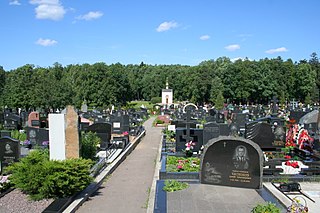| |||||
| Decades: | |||||
|---|---|---|---|---|---|
| See also: | |||||
The following lists events that happened during 1990 in the Union of Soviet Socialist Republics .
| |||||
| Decades: | |||||
|---|---|---|---|---|---|
| See also: | |||||
The following lists events that happened during 1990 in the Union of Soviet Socialist Republics .
November 7 – The Last Parade of The October Revolution takes on Moscow's Red Square on 73th Anniversary of the Bolsheviks Seizure of Power [6]
The following lists events that happened during 2000 in Russia.
The following lists events that happened during 1941 in the Union of Soviet Socialist Republics.

The Troyekurovo Cemetery, alternatively known as Novo-Kuntsevo Cemetery, is a cemetery in Moscow, Russia.

The Russian Soviet Federative Socialist Republic, previously known as the Russian Soviet Republic and the Russian Socialist Federative Soviet Republic, and unofficially as Soviet Russia, was an independent federal socialist state from 1917 to 1922, and afterwards the largest and most populous constituent republic of the Soviet Union (USSR) from 1922 to 1991, until becoming a sovereign part of the Soviet Union with priority of Russian laws over Union-level legislation in 1990 and 1991, the last two years of the existence of the USSR. The Russian SFSR was composed of sixteen smaller constituent units of autonomous republics, five autonomous oblasts, ten autonomous okrugs, six krais and forty oblasts. Russians formed the largest ethnic group. The capital of the Russian SFSR and the USSR as a whole was Moscow and the other major urban centers included Leningrad, Stalingrad, Novosibirsk, Sverdlovsk, Gorky and Kuybyshev. It was the first socialist state in the world.
The following lists events that happened during 1991 in the Soviet Union and Russia.
Events from the year 1992 in Russia
The following lists events that happened during 1937 in the Union of Soviet Socialist Republics.
The following lists events that happened during 1939 in the Union of Soviet Socialist Republics.
Events from the year 1993 in Russia.
The following lists events that happened during 1988 in the Union of Soviet Socialist Republics.
The following lists events that happened during 1943 in the Union of Soviet Socialist Republics.
Events from the year 1994 in Russia.
Events from the year 1995 in Russia.
Events from the year 1996 in Russia.
Events from the year 1997 in Russia.
Events from the year 1998 in Russia.
Events from the year 1999 in Russia.
The following lists events that happened during 1980 in the Union of Soviet Socialist Republics.
The following lists events that happened during 1989 in the Union of Soviet Socialist Republics.